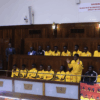News
Cat poopoo sold as coffee for over US$100 a cup
or Kopi Luwak is a hot seller beverage for many coffee shops across Europe. But many Ugandans would probably detest the way it is produced.
Civet coffee, is produced across the island of Bali, by civet ‘cats’, which eat coffee beans, digest them and produce faeces that are then collected, finished and sold as Kopi Luwak.
The distinctive tasting coffee can cost up to 100 $USD for a single cup and is already popular with coffee drinkers across Europe and the USA.
The demand for the world’s most expensive coffee is on the rise due to tourism, reveals a new study from global charity, World Animal Protection. But animal rights activists say the cats are poached from the wild and kept in cramped barren cages to produce gourmet coffee for visiting tourists.
Researchers from World Animal Protection have discovered that the novelty drink is on the rise, with more than 16 different civet coffee plantations emerging along one popular tourist highway of Gianyar and Bangli in Bali in the last 5 years alone.
But animal rights activists have launched scathing condemnation by farmers who cage the cats as a form of enslavement.
A study by WAP has found for example that 16 new plantations have been raised in Bali all intended for international tourists visiting Bali
“This high-end pricing has turned farming civet cats for coffee into an enslavement industry. The animals are snatched from the wild, kept in cramped cages where wire floors cut into their feet causing them physical and mental distress. They are also nocturnal and do not have shelter to hide. Many of the civet coffee farmers are uneducated on how to care for their animals and the civets often are often ill or die, all in the name of making coffee,” said WAP.
Wildlife researcher, Dr Neil D’Cruze at World Animal Protection says: ‘Civets are highly active nocturnal animals, that are poached from the wild and kept in cramped cages simply to draw in visiting tourists who are curious to know how ‘civet coffee is made.
‘When tourists see the caged civets it helps to convince them that they are drinking genuine real civet coffee as part of their tour. Sadly, many tourists are blind to the cruelty associated with caged civet coffee and even queue up to take a photo to share on social media’.
World Animal Protection first uncovered the cruelty associated with caged civet coffee in 2013. As a result, at least 13 retailers – including well known brands such as Harrods and Selfridges in the UK and Simon Lévelt in the Netherlands – took civet coffee off their shelves or agreed to further investigate.
Comments



















